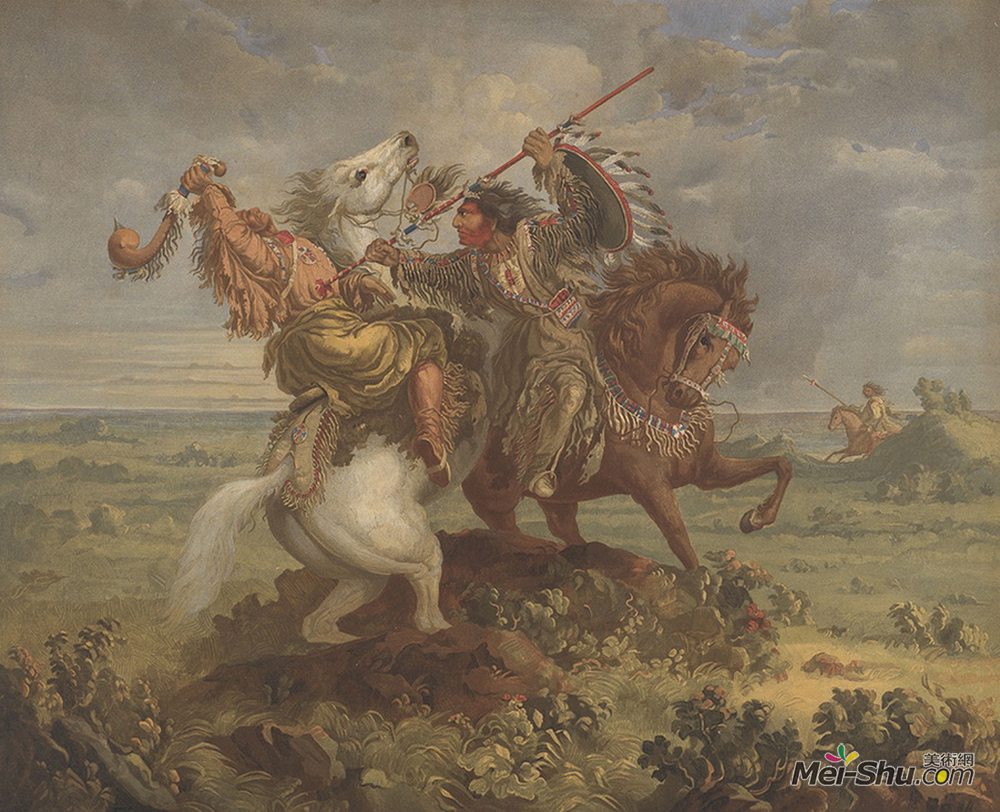 费奥多尔·索伦采夫(Paul Kane)高清作品《奥莫西西亚尼之死》
费奥多尔·索伦采夫(Paul Kane)高清作品《奥莫西西亚尼之死》
作品名:奥莫西西亚尼之死
艺术家:费奥多尔·索伦采夫
年代:1860
风格:浪漫主义
类型:战斗画
《Omoxesixany或Big Snake之死》是继保罗·凯恩的同名画作之后的一幅彩色平版画,是凯恩唯一一幅大规模生产和作为独立版画进行销售的画作。William Allan。主题很可能是艾伦选择的,他似乎认为这幅原作是凯恩最好的作品之一,它的处理表明了城市观众对戏剧“异国情调”的兴趣。一个克里战士,凯恩根据传闻想象的事件。2.没有已知的预备图,但图中描绘的棕马头和克里战士的肩袋的灵感来自凯恩收集的物品。3.人们可以想象凯恩在他的工作室里,依靠复制品。1820年,霍勒斯·韦尔内特(1789-1863)演绎了欧洲绘画作品,如无骑士赛马的起点,并根据他自己收集的原住民文物创作了这幅加拿大历史上引人注目的绘画。彩色石版画在空间关系和细节上对应于原始绘画的程度是显著的。然而,怀疑凯恩本人是否积极参与光刻工艺。打印机被认定为Charles Fuller和Hermann Bencke,普鲁士移民。富勒和本克的高超技艺,无论是在压花表面,创造纹理和深度,以及在广泛使用的颜色数量,是明显的;作为这一工艺的证明,彩色石版画已被用作可靠的参考保存原始绘画。
Title:The Death of Omoxesisixany
artist:Paul Kane
Date:1860
Style:Romanticism
Genre:battle painting
The Death of Omoxesisixany or Big Snake is a chromolithograph after Paul Kane’s painting of the same title, the only Kane painting to be mass-produced and marketed as a stand-alone print for framing.1 It was printed and published in Toronto in 1860 and no doubt underwritten by his patron, George William Allan. The subject matter was likely chosen by Allan, who seems to have considered the original painting one of Kane’s best, and its treatment points to an assumption of the urban audience’s interest in theatrical “exoticism.” The subject is the death of the Blackfoot chief at the hands of a Cree warrior, an event Kane imagined, based on hearsay.2 There are no known preparatory drawings, but the brown horse’s headstall and the Cree warrior’s shoulder bag depicted in the image were inspired by items Kane had collected.3 One can imagine Kane in his studio, relying both on reproductions of European paintings—such as The Start of the Race of the Riderless Horses, c. 1820, by Horace Vernet (1789–1863)—and on his own collection of Aboriginal artifacts to create this striking painting of Canadian history. The chromolithograph is remarkable for the degree to which it corresponds to the original painting in spatial relationships and in detail. It is doubtful, however, that Kane himself was actively involved in the lithographic process. The printers have been identified as Charles Fuller and Hermann Bencke, a Prussian immigrant. Fuller and Bencke’s superb workmanship is evident both in the embossed surface that creates texture and depth and in the extensive number of colours used; as a testament to this workmanship, the chromolithograph has been used as a reliable reference for the conservation of the original painting.
作品名称:《奥莫西西亚尼之死》费奥多尔·索伦采夫(Paul Kane)高清作品欣赏
作品链接:https://www.mei-shu.com/famous/27002/artistic-100605.html
作品类别:油画
免责声明:本站部分公开资料来源于互联网,目的是用于学术交流与讨论,并不代表本网赞同其观点和对其真实性负责。如果您认为我们的侵犯了您的权益,请与我们联系(banquan#mei-shu.com #替换为@),我们将在第一时间删除相关内容。